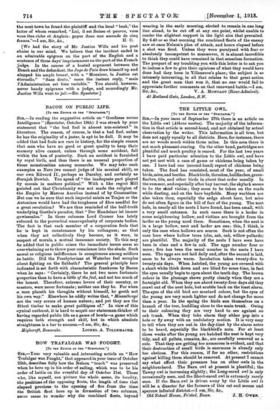BACON ON PUBLIC LIFE.
[TO THE EDITOR OF THE " SPECTATOR"]
Sj,—In reading the suggestive article on "Goodness versus intelligence" (Spectator, October 18th) I was struck by your statement that "the bad fool is almost non-existent" in literature. The reason, of course, is that a bad fool, unless Le has the originality of a jester, is apt to be dull. It may be added that bad fools are rare in history, for the simple reason that men who have no good or great quality to keep their memory alive cannot, unless through some accident, fall within the ken of posterity. Such an accident is furnished lz■y royal birth, and thus there is an unusual proportion of those monstrosities among monarchs. We may take such examples as Nero (we cannot judge of his musical skill), as our own Edward II., perhaps as Darnley, and certainly as Surajah Dowlah. You speak of "the inadequate part played by morals in matters political." With a like regret Mill pointed out that Christianity was not made the religion of the Empire by Marcus Aurelius instead of by Constantine. But can we be sure that such imperial saints as Trajan or the Antonines would have bad the toughness of fibre needful for a great revolution ? We are thus reminded of the half-truth underlying Goethe's paradox, that "Der Handehier ist immer gewissenlos." In these columns Lord Cromer has lately referred to the proverbial unscrupnlosity of corporate bodies. The fact is that each member of a corporation feels that le is kept in countenance by his colleagues; so that when they act collectively they become, as it were, in respect of morals, a mutual insurance society. To this may be added that in public crises the immediate issues seem so overwhelming as to throw poor conscience into the shade. Such moral or religious indifference is conspicuous among soldiers in battle. Did the Presbyterians at Waterloo feel scruples about fighting on the Sabbath ? The general principle here indicated is set forth with characteristic frankness by Bacon when he says "Certainly, there be not two more fortunate properties than to have a little of the fool, and not too much of the honest. Therefore, extreme lovers of their country, or toasters, were never fortunate; neither can they be. For when a man placeth his thoughts without himself, he goeth not his own way." Elsewhere he oddly writes that, " Misanthropi are the very errors of human nature ; and yet they are the fittest timber to make great politiques of." In view of this cynical outburst, it is hard to acquit our statesman-thinker of Laving regarded public life as a game of bowls—a game which requires both strength and skill, but in which absolute a traightneas is a bar to success.—I am, Sir, Ito.,






























































 Previous page
Previous page